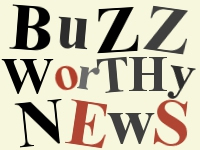 Buzz Worthy News
Buzz Worthy News
In this week’s Buzz Worthy News: Alice Munro wins the Nobel Prize, McDonald’s tries to appeal to Bibliophiles, Libraries are dying, and Kobo hates erotica.
Buzz Worthy News is Cuddlebuggery’s weekly news post bringing you all the best information about the book and blogging world, particularly for the venn diagram of people who overlap between the two. For new releases and cover reveals of all the best Young Adult fiction, check out our Sunday post: Hot New Titles.
Alice Munro Wins Nobel Prize
 Anyone who has followed Alice Munro’s career will not be very shocked to learn that she was named the 2013 award winner of the Nobel Prize for Literature. Munro has a long list of awards, including the Man Booker Prize, The Commonwealth Writer’s Prize, the Marian Engel Award and a handful more. What many may not know, however, is that she started out as a bookseller.
Anyone who has followed Alice Munro’s career will not be very shocked to learn that she was named the 2013 award winner of the Nobel Prize for Literature. Munro has a long list of awards, including the Man Booker Prize, The Commonwealth Writer’s Prize, the Marian Engel Award and a handful more. What many may not know, however, is that she started out as a bookseller.
Alice Munro tried selling other people’s books for years, but the deeper she dove into the book-selling business, the more she believed she could write her own stories.
Munro’s former husband, Jim Munro, said the author who won the Nobel Prize for literature on Thursday tried her best to be a businesswoman at the bookstore they launched in 1963, but she eventually quit selling and started writing — her true calling.
Which to me, just proves what I’ve thought all along. If you want to write good books, you need to read sell them.
“She is a fantastic portrayer of human beings,” said Peter Englund, permanent secretary of the Swedish Academy in an interview immediately after the announcement, adding that Munro’s consistent depiction of the rural Canadian landscape proves that she “has everything she needs in this small patch of earth.”
“This is so surprising and wonderful,” said Munro in a statement through her U.S. publisher, Penguin Random House. “I am dazed by all the attention and affection that has been coming my way this morning. It is such an honor to receive this wonderful recognition from the Nobel Committee and I send them my thanks.”
Munro added, “When I began writing there was a very small community of Canadian writers and little attention was paid by the world. Now Canadian writers are read, admired and respected around the globe. I’m so thrilled to be chosen as this year’s Nobel Prize for Literature recipient. I hope it fosters further interest in all Canadian writers. I also hope that this brings further recognition to the short story form.”
Awww… that’s so awesome. Munro is only the 13th woman to ever win the award, so now we’ve only got about… 93 more awards to go before we’re even with the mens. Whoohoo! You know, I can’t help noticing that she writes modern short fiction. I wonder if David Gilmour might find room in his curriculum for a Nobel Prize winner. After all, he “only teaches the best”.
McDonald’s Targets Book Addicts
First it was Beanie Babies, now it’s books. McDonald’s announced they’ll be starting a new campaign that will roll out over the next few years, starting with the first two weeks of November.
The chain, which typically offers toys in its kids meals, will package four original children’s books carrying a nutritional message Nov. 1 through Nov. 14 with its Happy Meals, the beginning of a massive children’s book push expected to last for several years. The chain said it expects to distribute 20 million books in that two-week promotion window.
The books, self-published by McDonald’s, will be based on company characters — but not the Hamburglar or Ronald McDonald.
Am I the only one who’s kind of heartbroken that the Hamburgler won’t get his own book? Don’t worry, though, McDonald’s will be serving up (yes, of course pun intended) a whole array of healthy eating stories for kids.
One book, “The Goat Who Ate Everything,” is about a goat who has a big appetite and struggles to eat well but eventually learns to eat smart. Another, “Deana’s Big Dreams,” shows how Deana, the world’s smallest dinosaur, grew tall by eating well.
You know what? Usually I would look at anything McDonald’s does with a set of anti-rose colored glasses. But this time, I’m gonna give them a pat on the back, because for once, they came up with a genuinely good idea. Books instead of cheap-fall-apart-the-first-time-they’re-played-with toys? Yes. Books that praise healthy eating? Yes.
Beware The Bitter Ex
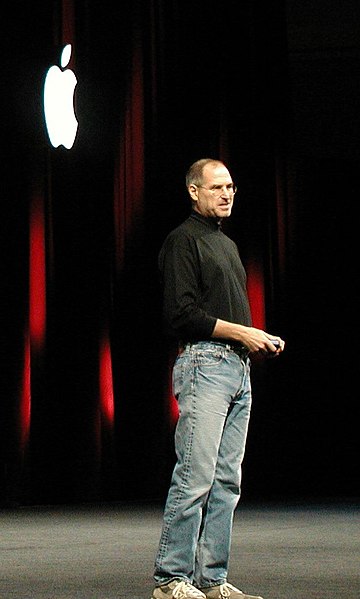 Hey, remember that guy/girl you broke up with and you said, “It’s not you, it’s me” or “I need to spend some time alone, to reflect on my life” or “That weird thing you do with your nose when you sleep is driving me crazy and I can’t take it anymore”? Well, it turns out, that can come back and bite you in the ass. Ask Steve Jobs. (Well, actually, you can’t. But if you could, I bet he’d have a lot to say on the subject.) In this case, Crisann Brennan went and wrote a memoir about her relationship with Steve Jobs called—I kid you not—The Bit in the Apple.
Hey, remember that guy/girl you broke up with and you said, “It’s not you, it’s me” or “I need to spend some time alone, to reflect on my life” or “That weird thing you do with your nose when you sleep is driving me crazy and I can’t take it anymore”? Well, it turns out, that can come back and bite you in the ass. Ask Steve Jobs. (Well, actually, you can’t. But if you could, I bet he’d have a lot to say on the subject.) In this case, Crisann Brennan went and wrote a memoir about her relationship with Steve Jobs called—I kid you not—The Bit in the Apple.
Brennan and Jobs met in 1972 when they were both students at Homestead high school in Cupertino, California. They dated on and off for five years and lived together with their friend Daniel Kottke, a computer engineer and one of the earliest employees of Apple.
Crisann Brennan has a lot of true interesting crazypants things to say about old Steve.
At the same time, Jobs was spending an increasing amount of time with long-time spiritual adviser, Japanese Zen master Kobun Chino Otogawa. “I would wake up to find Steve gently ecstatic, speaking to me in symbolic language with the Zen master’s distinct speech pattern. A number of times he spoke to me about how he had been given ‘five brilliant flowers,’” she writes. Brennan believed she was one of the “flowers”.
Jobs tried to take over Brennan’s spiritual development too. He took LSD with her and tried to get her to shout “Mummy. Daddy. Mummy, Daddy” in primal scream therapy while they were high, she writes. “The fact that he had never gone through primal therapy himself didn’t seem to concern him. It was that Pygmalion thing again,” she writes.
Whether most of this stuff is true, we can’t really know. But considering the fact that Jobs denied paternity of his unborn child and made Brennan take a paternity test over it, well, I guess I wouldn’t blame her if she said he liked to sniff monkey butts. And it probably makes for fascinating reading, so there’s that.
MacMillan Decides To Be Awesome
Okay, I admit that this news made me do one of those ridiculous fist pumps into the air that Arsenio was always fond of, but I couldn’t help myself! Your local library is getting more e-books, guys!
Macmillan officials today confirmed that it will expand its library e-book offerings to include its entire e-book backlist, more than 11,000 titles. Alison Lazarus, president of Macmillan’s sales division, confirmed the news to PW, saying the decision to expand library lending was made as part of the publisher’s “ongoing evaluation of e-lending.”
ZOMG! I’m excited and I don’t even know which books they’re putting up for sale! It’s not all sunshine and roses, though. The books would only be available for 2 years or 52 lends, whichever comes first. I’m not sure how long it takes for most books to get lent that many times, but that doesn’t seem like much.
Among the books that are part of the pilot are Pray for Silence by Linda Castillo, In the Bleak Midwinter by Julia Spencer-Fleming, The Tourist by Olen Steinhauer, The Quiche of Death by M.C. Beaton, The Lock Artist by Steve Hamilton and Heartsick by Chelsea Cain.
Still, compared to what libraries have had to go through to get books from publishers, this is a great first step in a positive direction. Let’s all cross our fingers that we can get even more!
Lemony Snicket Back In The Doldrums
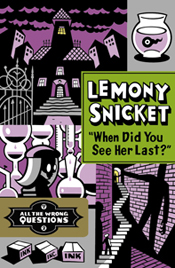
Next April Fools’ Day, Little, Brown will release File Under 13: Suspicious Incidents, a collection of 13 noir mini-mysteries illustrated by Seth, who also provides the art for All the Wrong Questions. But the author will keep himself busy in the meantime – maybe. He kicked off an 11-city promotional tour for All the Wrong Questions 2: “When Did You See Her Last?” on the book’s October 15 pub date, but in true Snicket fashion he may well shirk his responsibilities and leave some of the touring to his trusty representative, Daniel Handler. Only time will tell.
There is something deliciously maudlin and subversive about Lemon Snicket’s (Daniel Handler’s) style that I’ve always found addicting. This book is definitely going to be on my TBR list.
After writing the full-length All the Wrong Questions mysteries, was it a challenge to set up and solve File Under 13’s brief mysteries in so few pages? “It is said that a novel is a love affair and a short story is a kiss in the dark from a stranger,” said Snicket. “I’ve never been good at a kiss in the dark from a stranger, so as with hopeless romantics I stumbled a few times in my embraces.”
Hopefully it won’t be one big April Fool’s joke.
Novelist Is Thankful To Sell Cheap Books
 Hey, guess what, guys? Random House finally realized that readers like cheap books. And Rob Reid is ready to tell us all about it.
Hey, guess what, guys? Random House finally realized that readers like cheap books. And Rob Reid is ready to tell us all about it.
Random House is pricing my first novel like an MP3 single. And as the founder of the company that built the Rhapsody music service, I’m thrilled. The reason is that I love writing fiction, but building a big audience for self-published books would require ghoulish levels of social media stamina that I lack (proof: this is only my third blog post in 14 months). This means that if I want to reach readers—and I do—I need the backing and support of a publisher. Make that a solvent publisher.
There must have been a light bulb moment at that marketing meeting. I mean, you think it would have occurred to them a little earlier than… RIGHT NOW.
Being reliant on publisher solvency, I’m delighted. This is the only way to survive when the time-honored rules of your industry are collapsing or rewriting themselves all around you. You experiment. You learn. You adapt. You don’t do what the music industry did when faced with its digital bogeyman and whine, litigate, and deny.
Well, actually, Reid that’s essentially what the publishing industry HAS done (with very few exceptions). But Kudos to them for joining the rest of us in the 21st Century.
I had a front-row seat to that horror show back when we were building Rhapsody. And having watched the American music industry bleed out half of its revenues over 10 years, I sure don’t want publishing to do the same.
And to be my own voice of reason, of COURSE we don’t want every book that comes out to be the price of a song on iTunes. But loss leaders are a thing, y’all. And if most of those books were under 9.99, I’d buy them! Oh, and also, e-books make more money, even if they’re priced lower. (See next story)
E-books Will SAVE The Publishing Industry
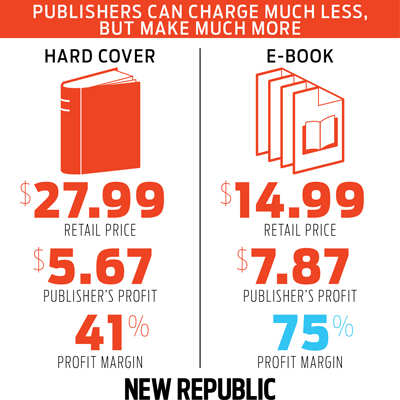 Which brings me to my next story. E-books are not the end of the world, book publishers! They’re the beginning of a whole new world of awesomeness. It’s 2013, and you’d think I wouldn’t have to say this, because it’s been like YEARS since e-books came out. But apparently, yeah, I’m going to have to. And don’t just take my word for it.
Which brings me to my next story. E-books are not the end of the world, book publishers! They’re the beginning of a whole new world of awesomeness. It’s 2013, and you’d think I wouldn’t have to say this, because it’s been like YEARS since e-books came out. But apparently, yeah, I’m going to have to. And don’t just take my word for it.
“I can buy songs for 99 cents, I can read most newspapers for free, I can rent a $100 million movie tonight for $2.99,” Russ Grandinetti, Amazon’s vice president of Kindle content, told me in January. “Paying $9.99 for a best-selling book—paying $10 for bits?—is in many respects a very strong accomplishment for the business.” At the individual level, everyone in the trade—whether executive, editor, agent, author, or bookseller—faces threats to his or her livelihood: self-publishing, mergers and “efficiencies,” and, yes, the suspicious motives of Amazon executives. But the book itself is hanging on and even thriving.
Honestly, book publishers should be thanking their lucky stars that books are a relatively unchanged form of communication. Everyone who reads a book expects that it’s going to be a certain length, be consumed and communicate to us in a certain way. E-books don’t interfere with that.
Even before the Internet, you could watch films at a discount, on VHS or DVD, so long as you accepted a downgrade in quality—no house-sized screen or transporting audio. Music fans, similarly, have traded the richness of vinyl to gain convenience. Some print stalwarts find e-readers a step down, but the fundamental experience of immersing yourself in a text is not bound up in any particular medium or venue. Reading never depended too much on sensual verisimilitude, only a mental leap from the words to the ideas they represent. The book is so low-tech, it’s hard for technology to degrade it.
Evan Hughes, who wrote this amazing article (really, go read it, it’s very encouraging for readers and writers and publishers alike), also went on to praise libraries and their role in cementing the value of books for readers. Because guess what? Unlike the latest heavy metal band, your mom is actually going to be happy if you tell her you want to go buy a book. Heck, she’ll probably fork out the money for a couple of them!
We’ve had libraries for centuries and fund them with public dollars because we view books not just as entertainments, but as repositories of culture and knowledge. Following the library’s lead, we hold on to our books and display them in our homes (in some cases even after we’ve switched to the Kindle). And while a certain amount of sharing—one reader passing a copy of a favorite title to a friend—has always been part of the trade, books’ perceived worth seems to protect them from outright online theft. “Book piracy is about to arrive on a massive scale,” a Telegraph headline announced in 2010—an evergreen prediction yet to pan out. A few publishers have experimented with selling e-books without the standard digital-rights management technology and have not seen bootlegged copies littering the Internet thereafter.
I want to marry this article, that’s how much I love it. No more excuses, publishers!
Confounding Controversies
The End of Libraries
 I’m seeing a lot of news stories about libraries lately and maybe it’s because more people are starting to understand just how ridiculous it is that publishers aren’t giving them access to e-books. This week’s library controversy comes to us courtesy of MG Siegler, in response to the story Wired wrote about libraries that I posted a couple weeks back. Siegler doesn’t mince words:
I’m seeing a lot of news stories about libraries lately and maybe it’s because more people are starting to understand just how ridiculous it is that publishers aren’t giving them access to e-books. This week’s library controversy comes to us courtesy of MG Siegler, in response to the story Wired wrote about libraries that I posted a couple weeks back. Siegler doesn’t mince words:
It’s sad, but it’s hard to imagine a role for the majority of libraries in the future. Maybe they become more like internet cafes (with some great art) or maybe they just fade away…
Siegler’s reasoning? Well, the economics, of course. He points out the same exact thing I did, which is, iTunes can sell an ebook for $15 and the library will pay, for the same book, $75. This an e-book that they will only get for a certain amount of time or a certain amount of lends, and it is economically unfeasible. Can’t argue with him there.
And so, with these things in mind, it’s hard not to imagine a future where the majority of libraries cease to exist — at least as we currently know them. Not only are they being rendered obsolete in a digital world, the economics make even less sense. One can easily envision libraries making their way to the forefront of any budget cut discussions.
I know this sucks. Libraries have been an invaluable part of human history, propagating our culture and knowledge over centuries. But recognizing the changing times and pointing out the obvious shouldn’t be considered blasphemy. It is what it is.
The internet has replaced the importance of libraries as a repository for knowledge. And digital distribution has replaced the role of a library as a central hub for obtaining the containers of such knowledge: books. And digital bits have replaced the need to cut down trees to make paper and waste ink to create those books. This is evolution, not devolution.
ARGH. Can I just say that really quick? First of all, libraries provide so much more information than this guy gives them credit for. Yes, you can get all the information in the world from the internet. You can even get the Youtube tutorial, but the plain fact of the matter is, LIBRARIES ARE STILL RELEVANT. They are a great place to get information that you can’t get on the internet. Yes, that might change some day in the distant future, but it certainly isn’t the case now. There is a reason people still buy books (whether it’s in a bookstore or not), because the internet certainly hasn’t gotten rid of the need for them. And I’m sorry, but that’s like the dumbest argument ever. If people are still buying books, then there is still a great need for the library. End of story.
The second thing I want to point out, Siegler actually references himself, so let’s take a minute to check that out.
It’s hard for me to even remember the last time I was in a library. I was definitely in one this past summer in Europe — on a historical tour. Before that, I think it was when I was in college. But even then, ten years ago, the internet was replacing the need to go to a library. And now, with e-books, I’m guessing the main reason to go to a library on a college campus is simply because it’s a quiet place to study.
You know when the last time I went to a library was, you elitist schmuck? Two days ago. I got a bunch of picture books for my kid, a book about making the perfect pizza crust, and The Diviners. You may have lost your need for them, but let me just tell you, there are PLENTY of people I know who are interested and passionate about keeping libraries around. And we are not deluding ourselves.
The real problem here isn’t technology. Libraries are places where super smart people work. People who go to school for years (and not just to learn how the Dewey Decimal system works) and realize that libraries must change to remain viable. My library, for instance, offers a wide variety of services: research help, computers for internet and school use, homework tutoring, tax help, story time for kids, classes on a variety of different subjects, books in several languages, and yes, Siegler, a quiet place to study.
The real problem is the publishing industry, which still doesn’t seem to realize the importance of e-books for their own bottom line. Instead they seem to feel that libraries are out to ruin authors’ careers. To go back and quote from the original Wired article:
That’s the problem some authors have with ebooks — not just that they earn less money on them, but that “They never degrade. They are perpetual. That harms writers directly,” as historian and novelist David O. Stewart has observed.
These authors don’t mind the high prices charged to libraries because they don’t even like libraries to begin with. Stewart has called libraries “undeniably socialist” because books can be loaned out (for free!) many times, costing writers money from presumably lost sales. This is the same justification book publishers use for their distorted ebook pricing.
I don’t appreciate Stewart’s argument, because as I pointed out earlier in this post, e-books make publishers more profits than hardbacks. If you’re not making your cut, buddy, take it up with them. Don’t blame the consumers. As for libraries, well, they could be as relevant and effective as they always have been, if publishers would give them a decent break and give them the same prices (or better!) that they give consumers. It’s ridiculous and really the only reason that libraries have had to carefully consider their budgets.
And just to give you an idea about how relevant libraries still are, let’s take a looksie some interesting facts via Pew Research(big thanks to Jacob Berg for taking the time to post this on his blog):
In a national survey of Americans ages 16 and older:
- 80% of Americans say borrowing books is a “very important” service libraries provide.
- 80% say reference librarians are a “very important” service of libraries.
Fully 91% of Americans ages 16 and older say public libraries are important to their communities; and 76% say libraries are important to them and their families. And libraries are touchpoints in their communities for the vast majority of Americans: 84% of Americans ages 16 and older have been to a library or bookmobile at some point in their lives and 77% say they remember someone else in their family using public libraries as they were growing up.
Because I’m a nice person, Siegler, instead of telling you where you can shove your article, I’m going to politely suggest you get yourself down to your local library and educate yourself before you spout another opinion about where it’s headed.
No Dino Porn For You!
 Erotica readers the world over let out a collective gasp of dismay when their beloved indie authors were zapped from the online shelves of two different retailers this week. It all started with the UK’s Mail Online outing WHSmith booksellers as peddling all types of taboo pornographic material on their website. It also provided pictures in the form of proof, showing children’s reading material next to some insanely graphic material.
Erotica readers the world over let out a collective gasp of dismay when their beloved indie authors were zapped from the online shelves of two different retailers this week. It all started with the UK’s Mail Online outing WHSmith booksellers as peddling all types of taboo pornographic material on their website. It also provided pictures in the form of proof, showing children’s reading material next to some insanely graphic material.

When they heard about the issue, WHSmith immediately took their site offline until they could guarantee that no such content would be viewable again. They also posted an apology to their customers saying (bold mine for emphasis):
Last week we were made aware that a number of unacceptable titles were appearing on our website through the Kobo website that has an automated feed to ours. This is an industry wide issue impacting retailers that sell self-published eBooks due to the explosion of self publishing, which in the main is good as it gives new authors the opportunity to get their content published. However we are disgusted by these particular titles, find this unacceptable and we in no way whatsoever condone them.
We are taking immediate steps to have them all removed. While we are doing this, we have decided to take our website off-line to best protect our customers and the public. Our website will become live again once all the self-published eBooks have been removed and we are totally sure that there are no offending titles available. When our website goes back online, it will not display any self published material until we are completely confident that inappropriate books can never be shown again. We sincerely apologise for any offence.
Then, like a domino chain of doom, Kobo also pulled every single self-published book from its online store. They also sent out an email to their authors(which is the first time I became aware of the whole thing):
To our Kobo Writing Life and self-publishing partners:
As you may be aware, there has been a significant amount of negative media attention in the UK regarding offensive material that became available across a number of eBook platforms. Kobo was included in the reports from media and we are taking immediate action to resolve an issue that is the direct result of a select few authors and publishers violating Kobo’s content policies.
In order to address the situation Kobo is taking the following steps:
1. We are removing titles in question from the Kobo platform.
2. We are quarantining and reviewing titles to ensure that compliance to our policies is met by all authors and publishers. We will ensure that content meeting the policy is made available online as soon as possible.
3. We are reviewing our policies and procedures to implement safeguards that will ensure this situation does not happen in the future.
Our goal at Kobo is not to censor material; we support freedom of expression. Further, we want to protect the reputation of self-publishing as a whole. You have our promise that we will do all we can to ensure the exceptions that have caused this current situation will not have a lasting effect on what is an exciting new channel that connects Readers to a wealth of books.
Sincerely,
Mark Lefebvre-Director, Kobo Writing Life
That is pretty much when the kindleboards blew up. People who hadn’t read the email yet were wondering why their books were suddenly gone. Some said it was only the UK site that was blocking them. Others were genuinely worried about income loss. One rather astute author pointed out Kobo’s visible hypocrisy via twitter:
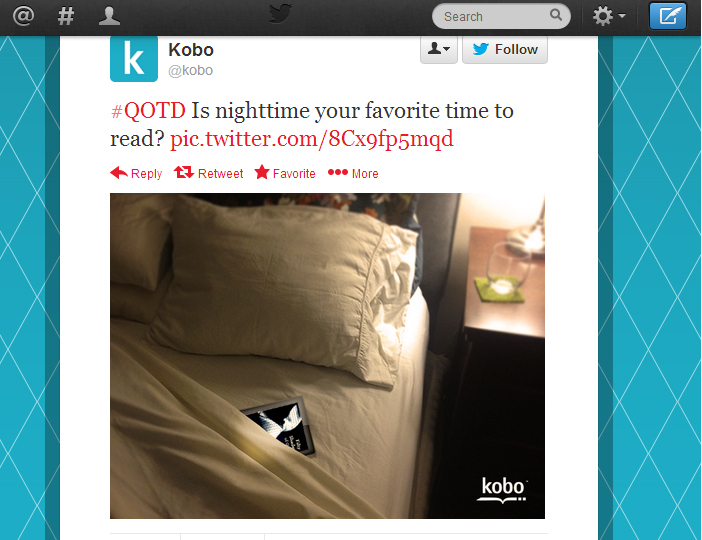
As far as I can tell, indies are still blocked from WHSmith, but Kobo seems to have all the indies you could ever hope to read (and believe me, there are a LOT), at least from the searches I’ve done. Still, plenty of annoying newsish websites online are still asking the stupidest question I’ve ever read: Will this be the end of self-publishing? I’m gonna let E.L. James, Amanda Hocking, Bella Andre, Jennifer Armentrout, Barbara Freethy, Marie Force, and MANY, MANY more answer that question. Let’s not be silly, people.
Still, I think this whole incident brings up very interesting questions about what online bookstores should or shouldn’t be publishing. I don’t think it’s fair to post Fifty Shades Freed amongst your bestselling fiction and then cry “foul” when indies post adult material. Also, the reason these books get self-published in the first place is because PEOPLE READ THEM. If I wrote a dinosaur erotica book (which I’m now definitely considering, haha) and no one bought it, I’d think, ‘Gosh, I should probably write something else.’ The fact of the matter is, ebooks make up 44% of the romance market. A nice chunk of those are erotic romance.
And it’s also been pointed out that many of the most extreme examples posted in the Mail Online article CLEARLY violate the terms and conditions of the sites that sell them. Way to police your own wares, guys. The public outcry has been varied. Some have openly discussed self publishers’ contempt for readers (say what??). Others have decided to start a petition to support freedom for writers to write in whatever genre they choose. Personally, I think that if you’re a grownup, then you should be able to choose what you read, even if what you like doesn’t do it for me. As long as it doesn’t violate any laws, that is.
Interesting Links:
Look, I’d love to write a never-ending stream of news, but I have other things I have to accomplish during the week. So here are some stories that I thought were interesting, but I didn’t have time to write about. Enjoy!
Free Calvin and Hobbes Comics Online, For Your Reading Pleasure
Woman Gives Birth In Bookstore
Nobel Prize Winner, Alice Munro, Discusses Censorship
Road Dahl’s Editor Talks About Working On The Witches
Reviewer Elizabeth Relates Reasons For Not Reviewing On Goodreads
Cuddlebuggery’s Steph Sinclair Offers You “Something Lame”
LBBA Reviews
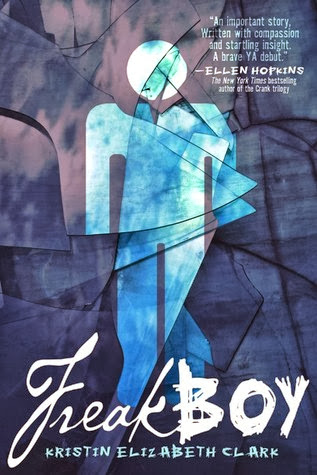 Freakboy written by Kristin Elizabeth Clark, reviewed by Don’t Fold The Page
Freakboy written by Kristin Elizabeth Clark, reviewed by Don’t Fold The Page
[rating stars=”five-stars”]
This novel is such a refreshing read. I’ve read some amazing books this year but I’ve been having the nagging feeling that most YA novels are starting to blend together and the majority of new releases have not been catching my attention. Then Freakboy came along. The entire novel is written in verse (which is a first for me) and it tackles heavy issues and raises a lot of questions. This novel addresses sexuality and how it is not black and white. It shatters the notion that you are either gay or straight, male or female. It opens discussion and leaves lots of room for future research. At the end of the novel, there’s a list of resources and one for further reading. I think that alone elevates this novel to a whole new level.



Jess @ Such A Novel Idea
This is always the post I look forward to most each week! Thanks for making it a weekly feature ladies!
Kate Copeseeley
Glad you enjoyed it! It’s really fun to write (but hard to decide what to put in and leave out).
Reading Wolf
I’m glad Mickey D’s will distribute books about healthy eating to kids, I don’t think it will last long though. The toys will be back. They always come back.
I wish publishers would cut libraries some slack. People want to read good books. Libraries can’t keep books everyone wants to read on the eshelves if they only have a 2yr/52 lends availability. This explains why most of the books I want to read in my library’s e-lending program are audiobooks. I can understand publisher’s point of view, you sell more books to libraries when they are requested frequently. BUT, think of the wider availability libraries can offer if the availability was extended.
Steph’s rap about Goodreads desperately needs to be set to music. That probably took a while to fine tune and is very relevant. Someone with a good voice (Or bad I don’t care) set it to music and distribute it PLEASE.
Kate Copeseeley
Oh, the toys will be back. I think the books are just a seasonal thing. Still, even once or twice a year is cool with me!
Publishers need to realize how valuable books are for their bottom line. I can’t even TELL you how many books I’ve bought because I discovered the author first at my local library.
Terri @ Starlight Book Reviews
Can I just say again that I LOVE your coverage of the e-book industry and all the various happenings? I particularly love that part of the Hughes article where he mentions publishers (like Macmillan’s Tor imprint) that have been releasing DRM-free ebooks and have seen remarkably little online piracy as a result.
The pending court decision on the price-fixing is incredibly interesting. A $3.06 refund per book for NYT best sellers and $0.73 per book for non NYT best sellers is a pretty high refund amount if you’re a high spender in the ebook category like me! I’m curious to see how that will work out.
Kate Copeseeley
Well thanks! I find the ebook situation a fascinating bit of history happening among us. I admit I wasn’t paying much attention when mp3s and iTunes took over the music industry. But now my eyes are wide open and I’m watching it all unfold eagerly. Whatever happens, I’m hoping the content creators will be the ultimate winner. (second to that, the consumer, of course. lol)
April Books & Wine
That’s cool about McDonalds and books — I know a few cereal companies are doing the same mainly because I buy the sugar filled crap and lo and behold I opened it and there was a book inside. It was awesome.
Also, boo to that library hater. BOOOOO. BOOOOOO.
I will have to click that Roald Dahl article. He is my favorite.
Kate Copeseeley
Authors who don’t like libraries are odd to me. Where do you think we learn to love you, writers???
Roald Dahl’s Witches is probably my favorite. It scared the bejeezus out of me as a child, so I was really excited to read this article. Hope you enjoy!
Meg Morley
The Hamburglar was always my favorite, his name is so much fun to say, plus I like redheads. All the bonus points to McDonalds (a sentence I never thought I’d say/type/whatever) for encouraging kids to read.
I don’t understand people who don’t like or see the point of libraries. How can you even respond to that level of wrongness?
Janis Kay
AMEN about defending libraries! Just because I wanted to be a librarian, parents would tell me in high school that I should look for something else because this is the information age and that libraries are becoming a “thing of the past” >:0 I’m SORRY for trying to get more ppl to read and enjoy it. I want to share the awesomesauceness of reading and libraries are integral for that:) I’ll leave all cynical comments for you to imagine, but they mirror yours;)
Buzz Worthy News: November 4, 2013 | Cuddlebuggery Book Blog
[…] remember that story I did about MacMillan and their 52 lend or 2 year total agreement with libraries? Gale just beat the pants off of […]
Wallene
RIGHT, RIGHT, RIGHT about the libraries! Despite, or maybe because of, being a Kindle user, I still borrow books from the library ALL THE TIME! Many books are NOT available in an e-version. Should we send those books to perdition?
Sorry, can you tell I’m passionate about this subject? Please support libraries.
Instyle conservatory blinds. All kinds of window blinds.
Made to measure conservatory and window blinds for your doors and windows. We make blinds for Patio, Conservatory, Folding and Sliding doors.